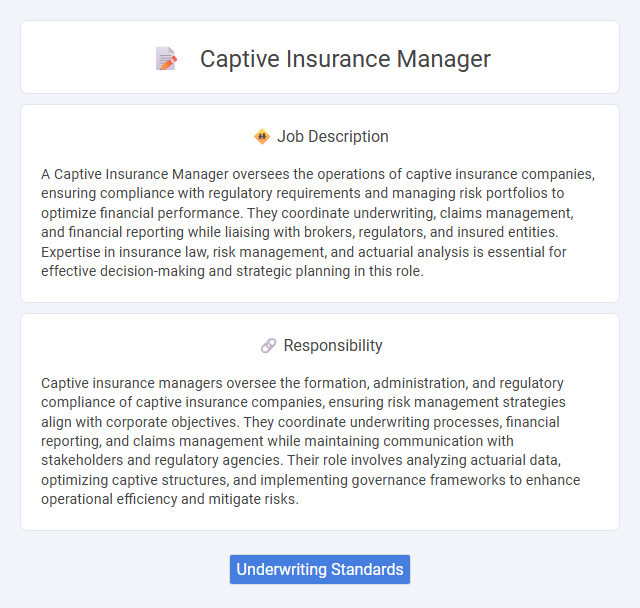
A Captive Insurance Manager oversees the operations of captive insurance companies, ensuring compliance with regulatory requirements and managing risk portfolios to optimize financial performance. They coordinate underwriting, claims management, and financial reporting while liaising with brokers, regulators, and insured entities. Expertise in insurance law, risk management, and actuarial analysis is essential for effective decision-making and strategic planning in this role.
Individuals with strong organizational skills, attention to detail, and experience in risk management or finance are likely suitable for a captive insurance manager role. Those who thrive in analytical environments and can navigate complex regulatory frameworks may find this position aligns well with their skill set. Candidates lacking patience or the ability to manage multifaceted insurance portfolios could struggle to succeed in this demanding job.
Qualification
A Captive Insurance Manager typically requires a strong background in risk management, finance, or insurance, supported by professional certifications such as CPCU (Chartered Property Casualty Underwriter) or ARM (Associate in Risk Management). Proven expertise in regulatory compliance, captive structures, and financial reporting is essential for successfully managing captive insurance entities. Strong analytical skills and experience with captive insurance accounting, underwriting, and claims administration further enhance job qualifications.
Responsibility
Captive insurance managers oversee the formation, administration, and regulatory compliance of captive insurance companies, ensuring risk management strategies align with corporate objectives. They coordinate underwriting processes, financial reporting, and claims management while maintaining communication with stakeholders and regulatory agencies. Their role involves analyzing actuarial data, optimizing captive structures, and implementing governance frameworks to enhance operational efficiency and mitigate risks.
Benefit
A captive insurance manager likely enhances risk management by providing tailored insurance solutions that reduce dependency on traditional insurers. This role may also improve financial control and cost efficiency through optimized policy structures and claims handling. Companies hiring captive insurance managers probably benefit from increased compliance oversight and strategic risk financing.
Challenge
A captive insurance manager probably faces the challenge of balancing regulatory compliance with effective risk management, requiring a deep understanding of complex insurance laws. Managing diverse client expectations and adapting to fluctuating market conditions may also create ongoing pressure. Successfully navigating these challenges often demands strong analytical skills and strategic decision-making.
Career Advancement
Captive insurance managers oversee risk management and compliance for self-insured entities, developing expertise in underwriting, regulatory frameworks, and financial analysis. Mastery in these areas positions professionals for career advancement to senior roles such as director of risk management, chief risk officer, or even executive leadership within insurance firms or multinational corporations. Continuous skill development in data analytics, legal regulations, and global insurance markets enhances promotion opportunities and compensation growth in this specialized field.
Key Terms
Underwriting Standards
A captive insurance manager specializing in underwriting standards ensures that risk assessments align with the organization's strategic objectives while maintaining regulatory compliance. They develop and enforce rigorous criteria for policy acceptance, pricing, and risk selection to optimize portfolio performance and minimize loss exposure. Effective management of underwriting standards supports financial stability and enhances the captive's value proposition as a risk management tool.
 kuljobs.com
kuljobs.com